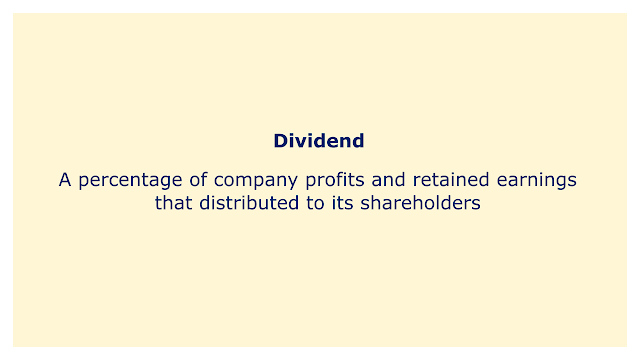 |
| Image: Moneybestpal.com |
A corporation distributes a percentage of its profits and retained earnings as a dividend to its shareholders. In return for their initial and continuing financial support of the company, shareholders are rewarded through this method. Also, it shows the company's potential for expansion and financial security.
Although it can also be done annually or semi-annually, dividends are typically given out every quarter. The board of directors determines the dividend amount and frequency depending on the company's earnings, cash flow, investment opportunities, tax implications, and dividend policy. The company announces the dividend details such as:
- Dividend per share: The sum of money that each shareholder will get for each share they possess.
- Record date: The deadline for shareholders to own shares and qualify for dividends.
- Ex-dividend date: The day shares begin to trade without dividends
- Dividend payment date: The day on which dividends are distributed to shareholders.
A firm may provide a variety of dividends, based on its preferences and circumstances. Some common types are:
For both investors and businesses, dividends have consequences. Dividends give investors a reliable source of income and a preview of potential future gains. The capital structure, cost of capital, valuation, and signaling impact of a company are all impacted by dividends.
- Cash dividends: These are the most prevalent dividends, with investors receiving cash payments straight into their bank or brokerage accounts. The amount of cash dividends paid out and retained earnings are decreased.
- Stock dividends: These are a special kind of dividend in which stockholders get more shares in the company rather than cash payments. The number of outstanding shares rises as a result of stock dividends, but the equity's overall worth remains unchanged. Companies looking to save money or bring down the price of their stock may prefer stock dividends.
- Property dividends: These are dividends in which shareholders receive goods or services in lieu of money or shares, such as securities or goods. If a company wants to distribute non-core assets or diversify its holdings, property dividends could be preferred.
For both investors and businesses, dividends have consequences. Dividends give investors a reliable source of income and a preview of potential future gains. The capital structure, cost of capital, valuation, and signaling impact of a company are all impacted by dividends.
